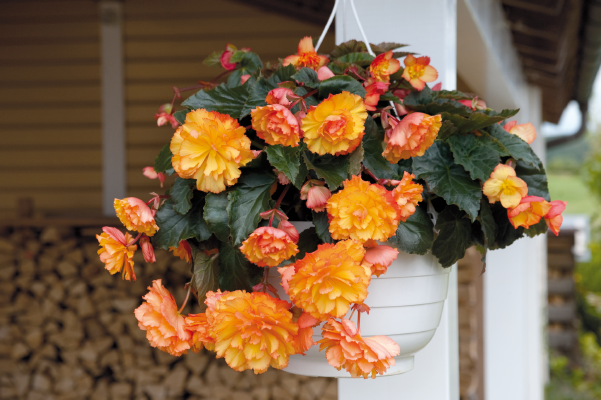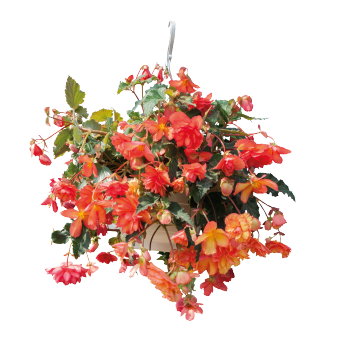

Illumination® Golden Picotee
Item no.: BT0801P- Vigorous, trailing plant habit
- Fully double flowers
- One plant creates a waterfall of color
- Exceptional seed quality provides high germination rates
Technical Guide: Click here
All information in our technical guide is based on our own trials and would therefore be as guideline only. Detailed cultivation aspects vary depending on climate, location, time of year and environmental conditions. Benary expressly disclaims any responsibility for the content of such data/information and makes no representation or warranty for the cultivation of any products listed. It is recommended that growers conduct a trial of products under their own conditions.
- Crop Time
- Spring: 16 - 20 weeks
- Height ∅
- 10 ″ / 25 cm
- Width ∅
- 9 ″ / 23 cm
- Exposure
- Sun - Partial shade
- Seed Form
- Pelleted Seed
- Best Uses
- Bedding, Hanging basket, Pot Plant
Culture guide
Usage
Packs, Pots, Hanging Baskets, Mixed Containers and Landscape
Sow time
November for flowering pots from April onwards, December-January for flowering bedding plants from May onwards
Sowing method
1-2 pellets per plug
Germination
Germination will occur in 7-14 days at 75-78 °F (23-25 °C). Sow seed on a fine media with good water holding capacity and good drainage. Consistent moisture levels are important to uniform germination. Humidity levels above 95 % and a media pH between 5.5 and 6.5 are important. Do not cover seed as light is required to germinate. Supplemental 24-hour assimilation light provided at this stage will increase germination, reduce crop time and improve plug quality.
Growing on
Transplant plugs into finished containers with a well drained media, and pH of 5.5 to 6.5. Maintain day length in excess of 14 hours. Continued supplemental lighting will improve plant quality and shorten crop time. Growing temperatures between 68-72 °F (18-22 °C) optimize growth and flowering. Fertilize at 150-250 ppm nitrogen in a well-balanced formula.
Media
Sowing media: pH 5.5-5.8; EC 0.5 – Begonia are sensitive to high salt levels.
Growing on: Use a well-drained, growing substrate; pH 5.5-5.8; EC 1.0-1.5; alternate between moisture levels wet and medium. Allow plants to approach a medium before re-saturating to a wet. Allowing plants to dry back too much can result in root damage.
Temperature
Plug culture: 22-23 ˚C until radicle emergence. Higher temperatures, exceeding 27 °C will inhibit germination. Upon radicle emergence, on day 10-14 reduce the temperature to 20-21 °C until cotyledon expansion. On day 21 the temperature can be reduced further to 20 °C.
Growing on: After transplanting 18-20 °C nights for the first 14 days or until the roots reach the bottom of the container. Thereafter temperatures may be lowered to 16-18 °C. An ADT (average daily temperature) of 19 °C will give the fastest finished crop. Temperatures below 14 °C will result in tuber formation and a delay of the crop. A DIF of 1,1-1,5 °C will result in a more compact crop requiring little to no growth regulators.
Fertilization
Plug culture: Begin fertilizing early once germination is complete, approximately day 14. Lower rates of feeding at 50 ppm 2-3 times per week will help to size up the seedlings. Under higher light conditions use a 17-5-17 fertilizer and under lower light a 14-4-14.
Growing on: Alternate between Calcium based fertilizer 14-4-14 and an Ammonium fertilizer 17-5-17 at 100-150 ppm. Keep the media EC at 1.5. Application of Potassium nitrate can help to keep the plants more compact. Under higher light and warmer temperatures a fertilizer with additional ammonium can be used. Tall, stretched plants with few flowers indicate too much ammonium. Stunted, chlorotic plants with marginal leaf burn indicate a lack of calcium and magnesium.
Stage I Starts with the radicle breaking through the testa. The roots are touching the medium. Ends with fully developed cotyledons.
Stage II Starts from fully developed cotyledons. Ends with the fully developed true leaf or true leaf pair.
Stage III Starts from the fully developed true leaf or true leaf pair and ends with 80% of the young plants being marketable.
Stage IV All young plants are ready for sale and in the process of being hardened off. This stage lasts about 7 days.
The cultural recommendations are based on results from trials conducted under Central European conditions. Different conditions in other parts of the world may lead to deviations in results achieved.







